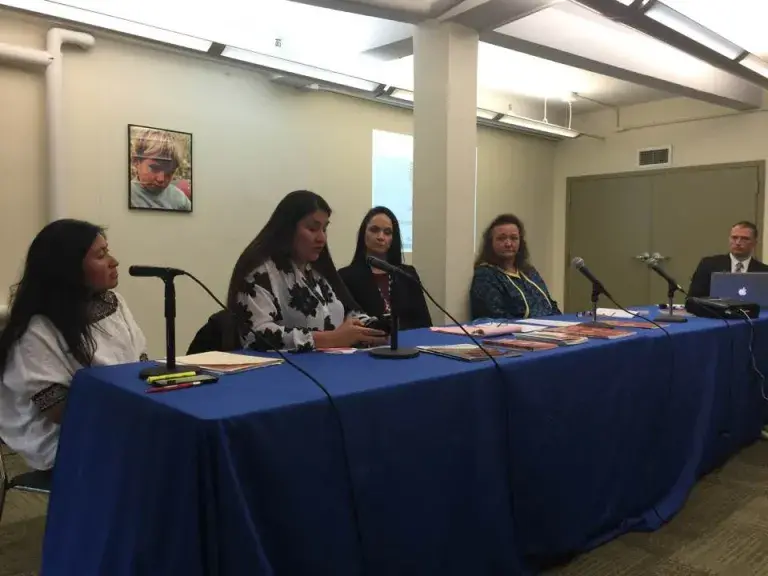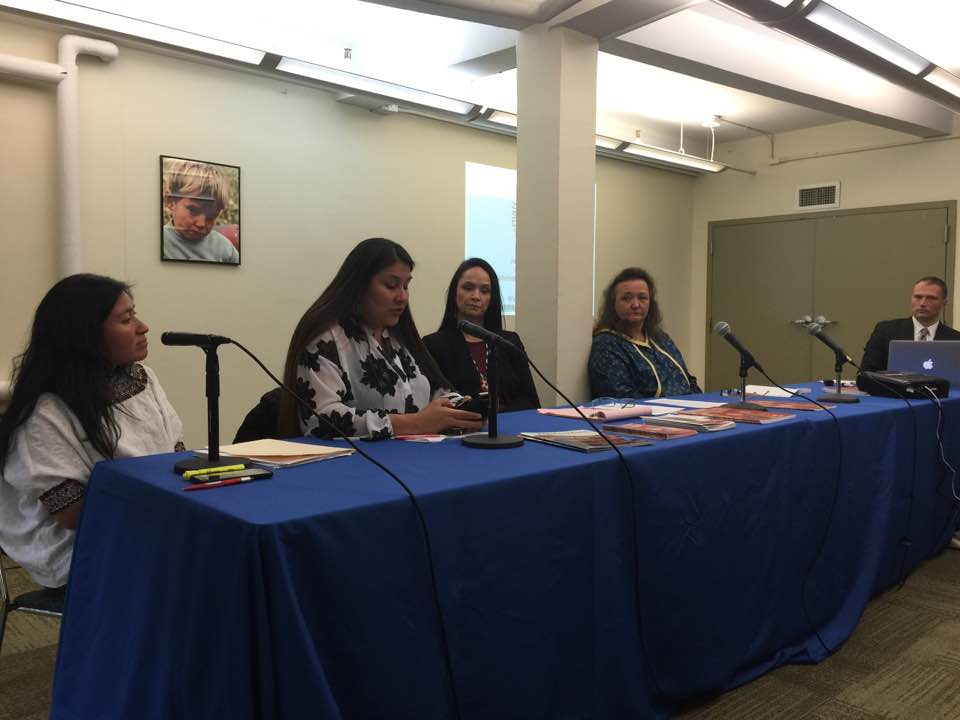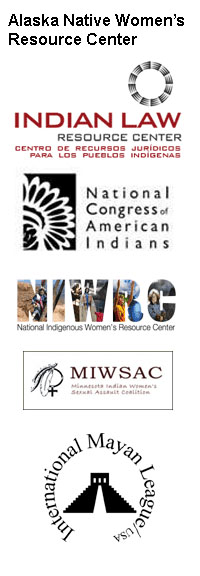
 March 17, 2017 | (New York, NY) — Indigenous women leaders from American Indian tribes and Alaska Native villages, and indigenous organizations converged on March 15, 2017 for a critical panel spotlighting indigenous women’s empowerment, their grassroots movement for safety for indigenous women, and their human right to be free of violence and discrimination. The parallel event, Ending Violence Against Indigenous Women as a Step Towards Empowerment, is part of the NGO-Forum of the sixty-first session of the UN Commission on the Status of Women, in New York City.
March 17, 2017 | (New York, NY) — Indigenous women leaders from American Indian tribes and Alaska Native villages, and indigenous organizations converged on March 15, 2017 for a critical panel spotlighting indigenous women’s empowerment, their grassroots movement for safety for indigenous women, and their human right to be free of violence and discrimination. The parallel event, Ending Violence Against Indigenous Women as a Step Towards Empowerment, is part of the NGO-Forum of the sixty-first session of the UN Commission on the Status of Women, in New York City.
“At the 2014 World Conference on Indigenous Peoples, member countries made historic commitments, including to support empowerment of indigenous women and to prevent and eliminate violence and discrimination against indigenous women,” said Jana L. Walker, senior attorney at the Indian Law Resource Center and director of its Safe Women, Strong Nations project. “Significantly, the Commission on the Status of Women identified empowerment of indigenous women as its focus area during this session,” Walker added.
Cherrah Giles, Chairwoman of the Board of Directors of the National Indigenous Women’s Resource Center, noted that “to empower and truly enable indigenous women to participate fully in all spheres of public and private life, we must first end this global crisis of violence and discrimination.” Discussing the national movement for safety and sovereignty in the United States, Giles added that “in the United States 4 in 5 American Indian and Alaska Native women have been assaulted and, on some reservations, these women are facing murder rates ten times the national average.”
“When Native women are missing and murdered, very little attention is given to them. We rarely see their names and faces on the news – we don’t hear what has happened to them – and the violence is normalized and even accepted through the silence and invisibility,” noted Nicole Matthews, Executive Director of the Minnesota Indian Women’s Sexual Assault Coalition. “We must do more to raise the visibility for Native women and our Two Spirit relatives in the United States.” The reported rates of abduction and murder of American Indian women and girls are alarming and represent one of the most severe aspects in the spectrum of violence committed against Native women today. Matthews emphasized that “If the women who are indigenous to this land are treated with love and respect, then we will have a model for treating all women on this land with that same love and respect.”
“In Alaska, Native women suffer the highest rate of forcible sexual assault in the United States. Alaska Natives are 16% of the state population, yet we make up 28% of the murder victims in the state.” said Tami Truett Jerue, Executive Director, Alaska Native Women's Resource Center. “This problem is based on policies of colonization and laws that create barriers to the implementation of local solutions. We are demanding more resources, but we also need state and federal policy changes to create a legal framework that will let Alaska Native villages implement the changes that we need.”
 Violence against indigenous women is a pervasive human rights violation worldwide. Speaking to the situation of Maya women in Guatemala, Juanita Cabrera Lopez, Executive Director of the International Mayan League/USA, opened by honoring the more than 40 girls who were killed in a fire at the Virgin of the Assumption Safe House on International Women’s Day. She noted that many of the girls were abused and raped prior to the fire and that this was one more example of the epidemic of violence against women. Yet, despite extreme rates of violence against women in Guatemala, the government routinely fails to act. Cabrera Lopez cited findings that while an estimated 10,000 women were murdered in Guatemala between 2000 and 2016, “98% of cases of murdered women are left in impunity.”
Violence against indigenous women is a pervasive human rights violation worldwide. Speaking to the situation of Maya women in Guatemala, Juanita Cabrera Lopez, Executive Director of the International Mayan League/USA, opened by honoring the more than 40 girls who were killed in a fire at the Virgin of the Assumption Safe House on International Women’s Day. She noted that many of the girls were abused and raped prior to the fire and that this was one more example of the epidemic of violence against women. Yet, despite extreme rates of violence against women in Guatemala, the government routinely fails to act. Cabrera Lopez cited findings that while an estimated 10,000 women were murdered in Guatemala between 2000 and 2016, “98% of cases of murdered women are left in impunity.”
She also discussed how legislation currently under consideration that would extend state recognition and economic support to Maya midwives would be an important step toward addressing violence. “For many women, particularly indigenous women, their initial contact in cases where they may be abused are with traditional healers and midwives. . . . We support the legislation put forth by Maya women as an important proposal that would advance the rights of women through our own ancestral systems and uphold our right of self-determination,” said Cabrera Lopez. The President of Guatemala vetoed this legislation earlier this week, but Cabrera Lopez hoped that international attention could lead the government to change course.
The event was cosponsored by the Alaska Native Women’s Resource Center, the Indian Law Resource Center, the International Mayan League/USA, the Minnesota Indian Women’s Sexual Assault Coalition, the National Congress of American Indians, and the National Indigenous Women’s Resource Center. For more information, email Chris Foley at [email protected].
Resources
